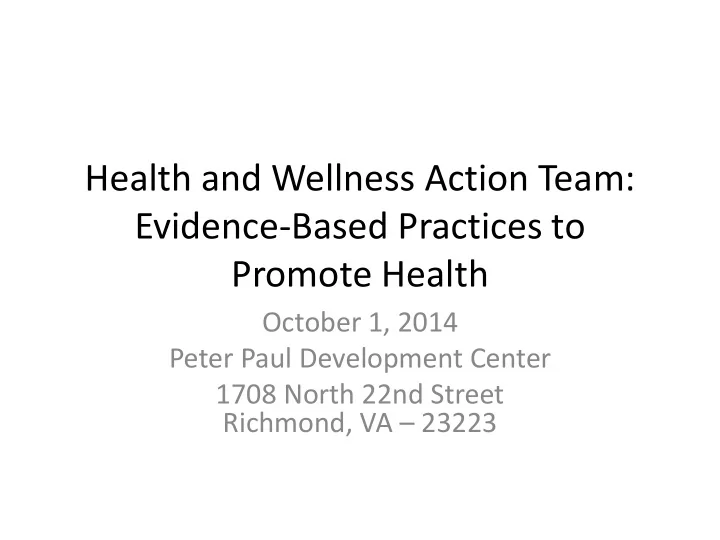

Health and Wellness Action Team: Evidence-Based Practices to Promote Health October 1, 2014 Peter Paul Development Center 1708 North 22nd Street Richmond, VA – 23223
Poverty in Richmond, VA
Educational Attainment in Richmond, VA
Life Expectancy in Richmond, VA
Demographic Profile for RRHA Communities HUD Family Report, June 2014
Creighton Overview • Number of individuals 1,324 • Number of units 504 (501 occupied) • Average household size 2.6 • Average annual income $8,485 • Average Total Tenant Payment $199/month
Household Size 1 Person 14% 30% 2 Person 14% 3 Person 4 Person 20% 23% 5+ Person
Age Distribution 11% 20% 0-5 6-17 18 - 50 35% 51 + 35%
Duration of Stay 8% Less than 1 year 22% 1-2 Years 19% 2-5 Years 5-10 Years 20% 10-20 Years 19% Over 20 Years 12%
Vulnerable Populations 70% 63% 61% 60% 50% 40% 30% 23% 20% 9% 10% 0% Elderly Disabled Households with Female Headed Children Housedhold wth Children
Income to Poverty Ratio 1% Extremely Low 8% Income, Below 30% Median Very Low Income, 50% of Median Low Income, 80% of Median 90%
Household Income 15% $0-$5000 43% $5,000 - $10,000 15% $10,001 - $15,000 $15,001 + 28%
Sources of Income 60% 57% 50% 39% 40% 36% 33% 30% 20% 10% 0% Any wages Any Welfare Any SSI/SS Pension Any other income
Creighton Court Needs Assessment (Preliminary Data)
Health Conditions Resident Health Conditions # Adults # Children 1. ADD/ADHD 6 18 2. Allergies 38 34 3. Alzheimer's Disease or Dementia 0 0 4. Ambulatory (relating to walking) or other 11 2 physical disabilities 5. Arthritis 26 1 6. Asthma 31 37 7. High Blood Pressure/Hypertension 49 0 8. Cancer 7 2 9. High Cholesterol 18 0 10. Depression 34 3 11. Diabetes 13 0 12. Fatigue/Low Energy 10 0 13. Heart Diseases 5 1 14. Lead Poisoning 0 0 15. Lung Diseases 1 1 16. Overweight or Obesity 14 0 17. Other 15 4
Resident Feelings of Safety at Night I always feel safe I never feel safe 27% 34% I feel safe most of the time I occasionally 17% feel safe 22%
VCU Health Systems Data Enterprise Analytics, compiled by the Office of Health Innovation April 2014
Top 10 diagnoses Mental health 27% Hypertension 26% COPD 15% Asthma 12% Diabetes 15% Substance abuse 4% Mental health and substance abuse 4% Dermatology 3% Congestive heart failure 5% Drug use 2% Data source: Enterprise Analytics, compiled by the Office of Health Innovation April 2014
Community Health Needs Assessment Bon Secours, Richmond Community Hospital, 2010
Health Concerns
Richmond Community Hospital Priorities Two priorities were identified: • Adult and childhood obesity • Mental Health
Concerns from the Informed Neighbors Corps • Substance abuse – Need for confidential programs and services – Prevention education for youth – Intervention programs for youth and adults – Substance abuse counseling including peer counseling • Crime and public safety • Trauma informed mental health care • Asthma • Services and resources inside the community – Pharmacy – Fresh produce – Green space and recreational facilities – Access to urgent care for children and pregnant women
Evidence-Based Practices
Wraparound Models • The Chicago Family Case Management Demonstration • Housing Opportunity and Services Together (HOST) • Bridges - Trauma Informed Community Building • Mercy Housing
Relocation • Chicago Family Case Management Demonstration, “Hard to House” • Enhanced mobility counseling • Relocation rights contract • Service engagement
Physical and Mental Health • Clinical mental health counseling • Substance abuse treatment • Hot Spotters
Socio-economic health • Opportunity Chicago: Transitional jobs program • Financial literacy training
Youth Best Practices • Support services Other potential topics • Early Childhood home visitation model • Rewards program (Chicago Pathways to Reward) • Asthma • Chronic disease prevention (obesity, diabetes) • Violence (Sexual health and safety) • Food insecurity
Recommend
More recommend